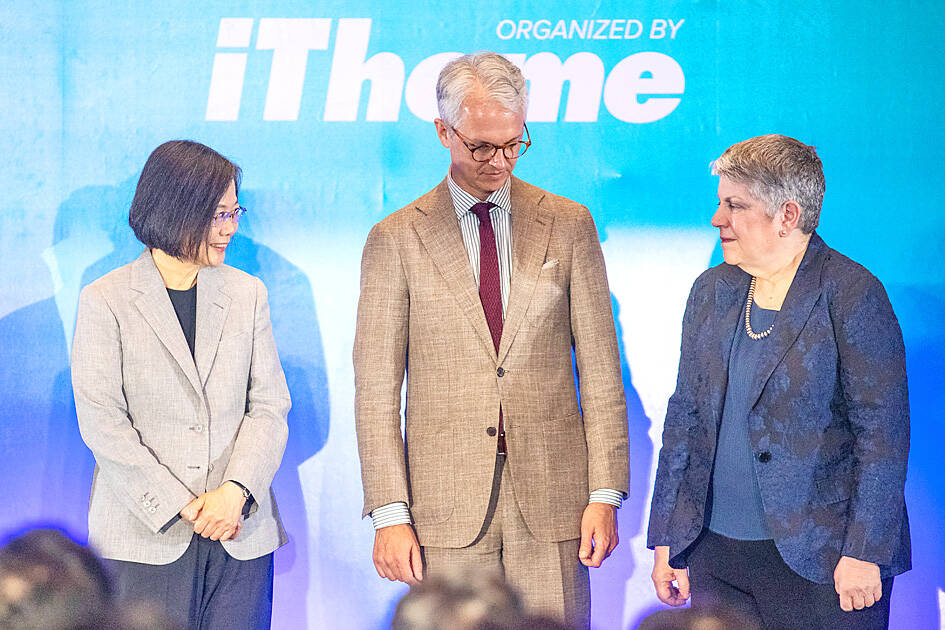Governments should work with the private sector and civic groups to bolster their countries’ cybersecurity efforts, former US secretary of homeland security Janet Napolitano said yesterday at the opening of a cybersecurity expo in Taipei.
Napolitano, who served as the department’s head from 2009 to 2013, said that governments should “enlist” the private sector and civil society groups to promote readiness for cybersecurity threats.
An example of how collaboration between the public and private sectors could make cyberconnections more secure was a department campaign that encouraged the public to provide tips to law enforcement agencies, she said.

Photo: RITCHIE B. TONGO, EPA-EFE
She said that her former agency received “a significant volume of tips” about signs of terrorism and terrorism-related activities under the campaign known as “If you see something, say something,” and that the information was often “actionable.”
No matter how strong an organizational defense might be, there might be an adversary that can break through it, and what is important is to “mitigate vulnerability to cyberrisks,” Napolitano said.
Napolitano, whose visit to Taiwan was not previously announced, is a member of the Intelligence Advisory Board of US President Joe Biden’s administration.
She was invited to deliver remarks at Cybersec, a three-day expo in Taipei showcasing the latest products and services of more than 300 leading cybersecurity brands.
The event, which ends tomorrow, also features keynote speeches and panel discussions by cybersecurity experts, company executives and government officials, including President Tsai Ing-wen (蔡英文).
Napolitano said that the world’s center of gravity is shifting to Asia and that as regional powers grow into global powers, security vulnerabilities are also emerging.
However, through information-security resilience, there is hope that known and unknown risks can be reduced, she said.
This is the first time Napolitano, who is also the founder of the Center for Security in Politics at the University of California, Berkeley, has visited Taiwan.
Taiwan and the university have a long-term and stable relationship, and have held many student exchanges, she said, adding that the institution has more than 1,000 Taiwanese alumni and the number of students from Taiwan attending has increased by more than 60 percent in the past five years.
Berkeley also works with Taiwan’s Industrial Technology Research Institute, Taiwan Semiconductor Manufacturing Co (台積電), and other partners to support innovative projects, she said.
Speaking at the expo’s opening ceremony, Tsai said that her administration sees cybersecurity companies and experts, as well as civic groups, as “important partners” in the effort to enhance Taiwan’s cybersecurity and resilience to cyberattacks.
The government would continue to promote domestic research and development of cybersecurity products and services while encouraging investment in start-ups providing cybersecurity solutions, she said.
At the same time, Taiwan would also continue to seek international cooperation to bolster national security in cyberspace, she said.

INVESTIGATION: The case is the latest instance of a DPP figure being implicated in an espionage network accused of allegedly leaking information to Chinese intelligence Democratic Progressive Party (DPP) member Ho Jen-chieh (何仁傑) was detained and held incommunicado yesterday on suspicion of spying for China during his tenure as assistant to then-minister of foreign affairs Joseph Wu (吳釗燮). The Taipei District Prosecutors’ Office said Ho was implicated during its investigation into alleged spying activities by former Presidential Office consultant Wu Shang-yu (吳尚雨). Prosecutors said there is reason to believe Ho breached the National Security Act (國家安全法) by leaking classified Ministry of Foreign Affairs information to Chinese intelligence. Following interrogation, prosecutors petitioned the Taipei District Court to detain Ho, citing concerns over potential collusion or tampering of evidence. The

Seventy percent of middle and elementary schools now conduct English classes entirely in English, the Ministry of Education said, as it encourages schools nationwide to adopt this practice Minister of Education (MOE) Cheng Ying-yao (鄭英耀) is scheduled to present a report on the government’s bilingual education policy to the Legislative Yuan’s Education and Culture Committee today. The report would outline strategies aimed at expanding access to education, reducing regional disparities and improving talent cultivation. Implementation of bilingual education policies has varied across local governments, occasionally drawing public criticism. For example, some schools have required teachers of non-English subjects to pass English proficiency

‘FORM OF PROTEST’: The German Institute Taipei said it was ‘shocked’ to see Nazi symbolism used in connection with political aims as it condemned the incident Sung Chien-liang (宋建樑), who led efforts to recall Democratic Progressive Party (DPP) Legislator Lee Kun-cheng (李坤城), was released on bail of NT$80,000 yesterday amid an outcry over a Nazi armband he wore to questioning the night before. Sung arrived at the New Taipei City District Prosecutors’ Office for questioning in a recall petition forgery case on Tuesday night wearing a red armband bearing a swastika, carrying a copy of Adolf Hitler’s Mein Kampf and giving a Nazi salute. Sung left the building at 1:15am without the armband and apparently covering the book with a coat. This is a serious international scandal and Chinese

TRADE: The premier pledged safeguards on ‘Made in Taiwan’ labeling, anti-dumping measures and stricter export controls to strengthen its position in trade talks Products labeled “made in Taiwan” must be genuinely made in Taiwan, Premier Cho Jung-tai (卓榮泰) said yesterday, vowing to enforce strict safeguards against “origin laundering” and initiate anti-dumping investigations to prevent China dumping its products in Taiwan. Cho made the remarks in a discussion session with representatives from industries in Kaohsiung. In response to the US government’s recent announcement of “reciprocal” tariffs on its trading partners, President William Lai (賴清德) and Cho last week began a series of consultations with industry leaders nationwide to gather feedback and address concerns. Taiwanese and US officials held a videoconference on Friday evening to discuss the